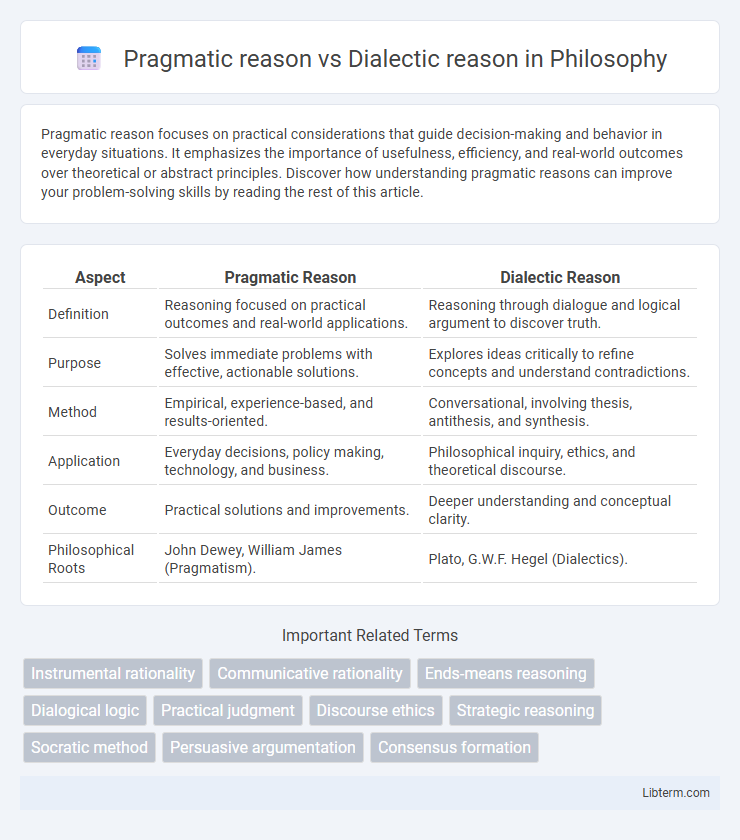Pragmatic reason focuses on practical considerations that guide decision-making and behavior in everyday situations. It emphasizes the importance of usefulness, efficiency, and real-world outcomes over theoretical or abstract principles. Discover how understanding pragmatic reasons can improve your problem-solving skills by reading the rest of this article.
Table of Comparison
| Aspect | Pragmatic Reason | Dialectic Reason |
|---|---|---|
| Definition | Reasoning focused on practical outcomes and real-world applications. | Reasoning through dialogue and logical argument to discover truth. |
| Purpose | Solves immediate problems with effective, actionable solutions. | Explores ideas critically to refine concepts and understand contradictions. |
| Method | Empirical, experience-based, and results-oriented. | Conversational, involving thesis, antithesis, and synthesis. |
| Application | Everyday decisions, policy making, technology, and business. | Philosophical inquiry, ethics, and theoretical discourse. |
| Outcome | Practical solutions and improvements. | Deeper understanding and conceptual clarity. |
| Philosophical Roots | John Dewey, William James (Pragmatism). | Plato, G.W.F. Hegel (Dialectics). |
Understanding Pragmatic Reason: Definition and Scope
Pragmatic reason refers to reasoning guided by practical consequences and real-world applications, focusing on what works effectively in specific situations. It encompasses decision-making processes that prioritize usefulness, efficiency, and outcomes over abstract principles or formal logic. This approach is central to fields like ethics, policy-making, and everyday problem-solving, where contextual factors and tangible results shape rational judgment.
Defining Dialectic Reason: Core Principles
Dialectic reason centers on structured dialogue aimed at uncovering truth through logical argumentation and critical questioning. Core principles include the process of thesis, antithesis, and synthesis, which facilitate the resolution of contradictions by integrating opposing viewpoints. This method emphasizes reflective thinking, logical consistency, and the dynamic development of ideas.
Historical Roots of Pragmatic and Dialectic Thinking
Pragmatic reason traces its historical roots to the practical problem-solving approaches of ancient Greek philosophers such as Aristotle, who emphasized purpose and utility in human actions. Dialectic reason, originating from Socratic dialogues, centers on logical argumentation and the systematic questioning method designed to uncover truth through opposing ideas. Both modes evolved through centuries, influencing modern philosophy, with pragmatism focusing on outcomes and dialectics on coherent reasoning structures.
Key Differences Between Pragmatic and Dialectic Reason
Pragmatic reason centers on practical outcomes and real-world applications, prioritizing what works effectively in specific contexts, while dialectic reason emphasizes logical argumentation and the systematic resolution of contradictions. Pragmatic reasoning adapts to situational circumstances to achieve desired results, whereas dialectic reasoning follows a structured dialogue process to reconcile opposing viewpoints for truth-seeking. The key difference lies in pragmatism's goal-oriented flexibility compared to dialectic's methodical pursuit of consensus through rational discourse.
Applications of Pragmatic Reason in Everyday Life
Pragmatic reason drives decision-making based on practical outcomes and real-world effects, often guiding everyday problem-solving and risk assessment. Applications include time management, where choices prioritize efficiency and convenience, and communication strategies tailored to achieve immediate understanding and cooperation. This contrasts with dialectic reason, which emphasizes logical argument and the synthesis of ideas through systematic questioning and debate.
Dialectic Reason in Debates and Philosophical Discourse
Dialectic reason in debates and philosophical discourse serves as a structured method of inquiry that seeks truth through logical argumentation and the systematic examination of opposing ideas. Employed by philosophers like Socrates and Hegel, dialectic reasoning facilitates the resolution of contradictions and advances understanding by refining concepts via thesis, antithesis, and synthesis. This method contrasts with pragmatic reason, which focuses on practical consequences and utility rather than the pursuit of abstract, objective truth.
Strengths and Limitations of Pragmatic Reasoning
Pragmatic reasoning excels in providing practical solutions by focusing on the real-world consequences of actions, making it highly effective for decision-making in everyday contexts. Its strength lies in adaptability and utility, enabling flexible problem-solving without relying on formal logic structures. However, pragmatic reasoning can be limited by subjective biases and situational variability, which may reduce consistency and rigor compared to dialectic reasoning's structured, argument-driven approach.
Challenges and Advantages of Dialectic Reasoning
Dialectic reasoning excels in exploring multiple perspectives to resolve conflicts and refine ideas through structured dialogue, fostering critical thinking and deeper understanding. Challenges include the potential for extended debates without resolution and the need for participants to possess strong logical and communication skills. Despite these obstacles, dialectic reasoning enhances collaborative problem-solving and promotes the discovery of nuanced solutions.
Pragmatic vs Dialectic Reason: Real-World Examples
Pragmatic reason emphasizes practical outcomes and real-world applicability, often demonstrated in business decisions where immediate results and feasibility dictate choices, such as project management strategies prioritizing cost-efficiency and deadlines. Dialectic reason involves structured argumentation and logical discourse aimed at uncovering truth through dialogue, exemplified in academic debates and legal proceedings where opposing views are systematically examined to reach a reasoned conclusion. Real-world scenarios highlight pragmatic reason in daily problem-solving and strategic planning, while dialectic reason guides consensus-building and critical analysis in intellectual and judicial contexts.
Bridging Pragmatic and Dialectic Approaches in Problem-Solving
Bridging pragmatic and dialectic approaches in problem-solving enhances decision-making by combining practical, action-oriented strategies with structured, logical argumentation. Pragmatic reasoning focuses on the effective implementation of solutions based on context and outcomes, while dialectic reasoning emphasizes critical evaluation through dialogue and opposing viewpoints. Integrating these methods fosters comprehensive solutions that are both feasible and rigorously justified, improving adaptability and consensus in complex scenarios.
Pragmatic reason Infographic

 libterm.com
libterm.com